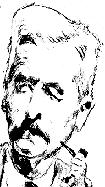
About 1900 the family moved to Oxford, Mississippi, where Faulkner's father owned a livery stable and where he later became business manager of the University of Mississippi. Faulkner entered public school there and went easily through the first five grades. After that his schooling was erratic.
The outbreak of the war sent him to Canada, where he joined the Canadian Flying Corps. Upon his return to Mississippi, Faulkner enrolled at the University of Mississippi. He did poorly in English and remained a student for only a year. Then he drifted to New York City, where he worked in Lord & Taylor's book department, and drifted back to Oxford. He worked at odd jobs for a period, and then briefly held an appointment as university postmaster: a certain reluctance to distribute mail cut this career short.
It is now that Faulkner seems to enter upon a state of mind which, for lack of a better word, might be called a crisis. However, with the help of a subsidy from Phil Stone, Faulkner published in 1924 a little book of poems called The Marble Faun. The original price of which was $5 but has since increased in value by 5000%!
Faulkner wrote his first novel, he said, because he liked the way of life led by the one novelist he knew, Sherwood Anderson. He completed the novel in six weeks, and Anderson said he would send it to his publisher provided he did not have to read it first. The novel was Soldiers' Pay, but before it was published, Faulkner at last got the job he had been looking for, and in the summer of 1925 he shipped as a deckhand on a freighter bound for the Mediterranean and Genoa. He spent from six to eight weeks tramping about Europe, mostly Italy and France.
He returned to Oxford, and with Soldiers' Pay in print he settled down to write fiction. However, since neither of his first two novels, Soldiers' Pay and Mosquitoes, sold very well, Faulkner found himself in the position familiar enough to writers, of being unable to live by his writing. Disillusioned by his glimpse of the New Orleans Bohemia, he took a job as a night superintendent of a power plant. There, in the town soon to figure in his novels as Jefferson, he wrote the books that would bring him a world-wide reputation.
Note: The drawing of Faulkner is taken from the cover of William Faulkner: A Critical Study, as are the references in the above text. (University of Chicago Press, Chicago, 1975)